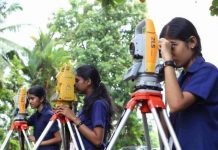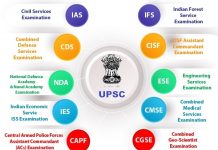What is Oceanography? & Oceanology courses in India
Oceanography is the science of learning oceans and the numerous processes related to it. It is also recognized as oceanology or marine science. This is a topic that is slowly but progressively attracting interest of the scholars in India. The subject compacts with the study of the ocean bed, ocean currents, waves, marine organisms, plate tectonics, ecosystem analysis, fluid dynamics and other linked matters. Oceanography is also connected to numerous other subjects like geology, physics, meteorology and geography. The education of the marine flora and fauna and judging their consumption-worthiness is too a part of the subject.
The key branches of oceanography comprise biological oceanography, chemical oceanography, physical oceanography and geological oceanography. For any scholar looking to follow an exciting field that also delivers a bright career, oceanography is a very decent choice. There are quite a few premium institutions in India which offer options in oceanography. As an oceanographer, you will typically find yourself working on a ship or on a coastal base but there will also be sufficiently of time spent in the laboratory for data interpretation.
Numerous oceanographers are also betrothed in studies to predict the impact of amplified carbon dioxide, depletion of the ozone layer, effect of fertilizers, fossil fuels and other items on oceans. It is a faultless blend of scientific research and application of the similar in the fields of engineering and technology. For a emerging country like India, oceanography is a fast-growing profession that proposals first-rate career opportunities.

Course Eligibility: Oceanology courses in India
Oceanography is accessible as a 2-year full-time postgraduate platform through an MSc degree. In certain universities, it is also obtainable in the form of marine biology. The suitability for joining the sequence is the completion of a BSc degree in Physics, Earth Science, Microbiology, Applied Science, Chemistry, Botany, Zoology, Agriculture or Fishery Science. The assortment is on the basis of merit and a minimum of 55% grades in the graduation level is necessary. Some of the alleged universities have their own entry tests for the selection of the applicants. Both the overall marks got in the qualifying examination and that in the entry tests are taken into consideration during selection.
Some of the topmost courses in this field are listed further down.
- Master of Science (M.Sc) in Oceanography
- Master of Science in Marine Biology
- MTech in Ocean Engineering
- MTech in Ocean Technology
After an MSc degree, you can also follow an MTech in Oceanography or Marine Biology, though a lawful GATE score is vital for that purpose in certain cases. In case you are a scholar with anMSc degree or a BTech degree in the pertinent field, you are also qualified for the MTech course. MPhil and PhD options are also obtainable by some universities. The most popular doctoral options in this field are listed further down.
- MPhil in Marine Biology
- MPhil in Chemical Oceanography
- PhD in Oceanography
Oceanography Course Subjects
The syllabus contracts with not only the details of the theoretical aspects but likewise with the numerous techniques and methodology. The MSc program option is usually divided into four semesters and though the syllabus differs from one university to the other, the tables further down will give you a basic idea about the subjects covered.
Semester I
- Physical Meteorology
- Physical and Dynamical Climatology
- Dynamical Climatology
- Physical Oceanography
- Practical
- Computer Programming and Data Processing
- Meteorology and Oceanography Computations
- Viva Voce
Semester II
- Dynamical Oceanography
- • Synoptic Meteorology
- • Advanced Dynamical Meteorology
- • Electronics
- • Practical
- • Synoptic Analysis
- • Electronics
Semester III
- Air-Sea Interaction
- Cloud Physics
- Numerical Weather Prediction
- Observational Techniques
- Practical
- Numerical Weather Prediction
- Instruments
Semester IV
- Climate Modelling
- Satellite Meteorology
- Agricultural and Hydrometeorology
- Tropical Meteorology
- Practical
- Applied Meteorology
- Dissertation
Oceanography Course Fees: Oceanology courses in India
| SR.NO. | COLLEGE | Course | Total course fees in INR |
| 1 | Annamalai University | Integrated BSc+MSc | 74475 |
| 2 | Andhra University | MSc | 29640 |
| 3 | IIT Bhubaneswar | MSc | 266000 |
| 4 | Amity University, Jaipur | MSc | 184000 |
Course Suitability
Biological Oceanography: This includes the learning of plants, animals and microbes in the ocean and is also called as “marine biology”.
Chemical Oceanography: It includes learning the chemistry of the ocean in connotation with the chemistry of the atmosphere.
Geological Oceanography: This deals with the education of ocean floor geology, with plate tectonics and paleoceanography.
Physical Oceanography: This topic deals with the physical qualities of the ocean involving the tides, currents, waves and salinity.
It is obvious from the nature of the subjects that the education needs both scientific and mathematical skills. Separately from these, the following features are also important for a scholar.
- An curiosity in the ocean and the environment as a entire along with a sense of escapade that is needed to spend long hours on the oceans and seas.
- Good problem-solving abilities and observational skills that will assistance in the research aspects.
- Good communication skills with writing skills that will be vital in writing reports and data analysis.
- Competence with computer software used for digital mapping, remote detecting and modelling.
- In adding strong physical and mental qualities including patience, stamina and flexibility to new environments and challenges, particularly on the sea, is needed. Knowledge of swimming and diving is also an vital skill.
Career Options
The career chances come in both governmental and private administrations. The UPSC behaviours tests for assignments in Central Government Agencies like the Geological Survey of India, Meteorological Survey of India and the Central Groundwater Board. The businesses in the private sector include environmental consultancies, ocean instrumentation and manufacturing companies, water corporations, energy supply corporations and NGOs.
Other associations that offer employ include Coal India, Mineral Exploration Authority, Oil & Natural Gas Corporation and Hindustan Zinc. An oceanographer can be employed in a wide range of capacities including Environmental Scientist, Geo-desist, Geographer, Geologist, Geophysicist, Hydrographer, freight and maintenance manager, Oceanographer or as a mining engineer.
Salary Packages
The salary packages will differ depending on the organisation and the post. In the public segment, a postgraduate can earn wherever between INR 15,000 to INR 22,000. In the private segment, the preliminary salaries are slightly higher, ranging around INR 30,000 per month. Oceanographers can also discovery occupation options in countries like US, UK, France where salaries are higher. The chart added further down will provide a basic idea about the salaries of an oceanographer for several positions. This will vary as per the knowledge levels.
| Job Profile | Average Salary (in INR) per annum |
| Oceanographer | INR 4 to 6 lacs |
| Ocean Freight Manager | INR 5.5 to 7 lacs |
| Ocean Import Manager | INR 5 to 6 lacs |
| Maintenance Assistant | INR 2 to 4 lacs |
| Production Head | INR 7 to 9 lacs |
Thats it in Oceanology courses in India. Also check B.pharmacy course information.
To know more at Education in India.




































